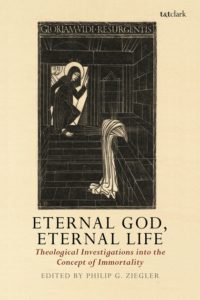
Eternal God, Eternal Life: Theological Investigations into the Concept of Immortality
Philip G. Ziegler, ed. Eternal God, Eternal Life: Theological Investigations into the Concept of Immortality. New York: Bloomsbury T&T Clark, 2016, 215 pp. $122.00.
Reviewed by Theron Clay Mock III
How do contemporary Christian theologians approach the perturbing concept of immortality and corollary doctrines such as creation, resurrection, and time? Under the auspices of Professor John Martin Fischer’s Immortality Project, ten theologians gathered to address these concerns at the University of Aberdeen during the year 2014– 2015. This collection of essays contains the fruits of their labors. They labor at the conceptual level throughout, thus not providing practical, pastoral, or psychological approaches to immortality. There are traces of ethical insight, yet at a methodological rather than normative level. Theological and philosophical approaches bind this piece together. The work displays an intellectually robust dialogue within the Christian community that contributes to modern intrigue in human immortality.
Four of the chapters converse with, or provide a critique of, Karl Barth’s doctrinal contribution to the book’s theme. A seminal figure, Barth marks a significant break from and improvisation on classical notions of God’s eternity and creaturely time (chapter one), the relationship between creation and new creation (chapter five), the quality of resurrection life (chapter six), and whether humans were created originally mortal or immortal (chapter ten). For readers interested in Barth’s theology these essays will be of most interest, yielding a noteworthy addition to Barth studies. The rest of the chapters engage other prominent theologians. The goodness of God and eternal life are connected, compared, and contrasted in the thought of both St. Augustine and Thomas Aquinas (chapter two). Eternity and time, the original creation and new creation of human bodies is probed with philosophical precision and insights from Luther (chapter three). Aquinas reappears discussing the creational distinctions between angelic and human immortality (chapter four). Some contemporary theologians, Jüngel and Moltmann, arrive with perspectives on eternal life, judgment, and justification (chapter seven). Calvin and Bullinger educate readers on Reformed approaches to how the Eucharist and immortality converge (chapter eight). Lastly, Tillich provides a distinct twist to the tradition’s understanding of the eternal living God and human eternal life now (chapter nine). The spread of theologians covers a vast amount of time, save for pre-Augustinian thinkers. These chapters will catch the eye of readers interested in those specific theologians or doctrines as well as demonstrate the versatility of Christian variations on the theme of immortality.
This book’s highest peak is the internal connection drawn between the doctrine of God (theology proper) and the other doctrines that are engaged. For example, as thetitle hints, there is an inherent relationship, sometimes ontological or logical, between the eternity of God and the eternal life of human beings. If eternity is timelessness, as classically held, or if it is the simultaneous movement of past, present, and future, as Barth proffers (chapter one), then eternal life for human beings will be construed accordingly. This connection sets the Christian understanding of immortality apart from other philosophical conceptions. Per Plato’s dialogues and Kant’s critical project, which are both critiqued, immortality is a necessary constituent of human being. The philosophical captivity of theologians throughout history has complied with this understanding, under the guise of original immortality. These essays release captive theologians from the foreign domain of philosophical immortality, detailing instead the unique Christian take on life unending (quantity) and life to the fullest (quality). This is not to flatten out the differences among them—Barth and Tillich are diametrically opposed—but rather to highlight that the Christian tradition contains its own take on these concepts and need not submit to regnant perspectives. We see this in the following instances where humans were created originally mortal (chapter ten). The assurance of immortal life is testified to during the Eucharist (chapter eight). The final enemy, Death, is destroyed by a judgment that leads to eternal life (chapter seven). God will be the only good in the new creation, a riff on the beatific vision (chapter two). And Katherine Sonderegger tries to paint with words what no eye has seen, “the very color of Heaven is not made vivid before our eyes” (119).
Nevertheless, after completing these essays the reader may leave wanting something more. Given all the various and sometimes contradictory theologies surrounding immortality, how is one to adjudicate between them? A question and response section would only have taken this book longer to publish and added more volume to this slim publication; yet, it could have provided an internal conversation among the theologians. They conversed with everyone but themselves, it seems. Such an internal dialogue would only have continued to delineate the distinctions and material relations between an eternal God and eternal life.
This work succeeds in what it set out to do, providing a vast array of Christian theologies concerning human immortality. The major contribution of Christian thought to this concept is how theologians connect it with their worship of an eternal God. It shows that the Christian concept of immortality is not formless and void; actually, there is much to a Christian vision of eternal life. The book covers seminal theologians, thus providing a good resource for students and scholars investigating this area. This publication ought to provide a foundation for more research into this realm of thought from Christian theologians.
Theron Clay Mock III, MDiv Student, Princeton Theological Seminary
